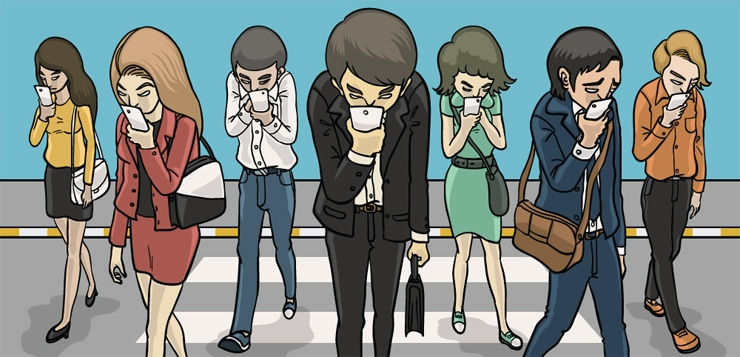Tjiang W, See KS Kris

On average, we check our phones 150 times a day, which is roughly every four to six minutes
87 percent of teens communicate using text messaging rather than face-to-face interaction
46 percent of people in relationships have been phubbed
22.6 percent say phubbing caused relationship conflicts
Two-thirds check their phone even when it is not vibrating or ringing
Wondered what is Phubbing means? Think of it this way: phone + snubbing = phubbing. Sadly, it’s something we’re all seeing around us on a daily basis these days. Thus, phubbing is the act of snubbing someone in a social situation by looking at your phone instead of paying attention to them.
We’ve all been there, as either victim or perpetrator. We may no longer even notice when we’ve been phubbed (or are phubbing), it has become such a normal part of life. However, research is revealing the profound impact this sort of snubbing can have on our relationships and well-being.
“Ironically, phubbing is meant to connect you, presumably, with someone through social media or texting,” says Emma Seppälä, a psychologist at Stanford and Yale universities. “But it actually can severely disrupt your present-moment, in-person relationships.”
Why do people get into the phubbing habit in the first place? Not surprisingly, fear of missing out and lack of self-control predict phubbing. However, the most important predictor is addiction to social media, to the phone and to the Internet. Internet addiction and phubbing disconnect us from ourselves. Plunged into a virtual world, we hunch over a screen, strain our eyes unnecessarily, and tune out completely from our own needs — for sleep, exercise, even food. The impact of this addiction is particularly worrisome for children whose brain and social skills are still under development.
Phubbing includes any of the following ways of using a smartphone:
Glancing at your phone in the middle of a conversation
Checking your phone when the conversation stalls
Keeping your phone close by even during one-on-one time with someone
Interrupting a real-life conversation to answer your phone
Constantly checking a cell phone
Phubbing is one example of how technology is affecting social skills for both teens and adults. Moreover, it is a symptom of cell phone addiction. In fact, it’s one of the most common teenage cell phone addiction symptoms.
People who phub (often called “phubbers”) often entertain themselves with their phones in one of a variety of ways, including:
Scrolling through their social media feeds
Posting a selfie or photo of their meal or activity
Texting other people
Playing online games.
It seems that when we're phubbed, we're internally screaming, "Hello! I'm here, willing to have a face-to-face conversation with you. Why are you more interested in your cell phone than me?" Consequences of phubbing. In the latest study on the subject, phubbing was found to threaten four “fundamental needs” — belongingness, self-esteem, meaningful existence and control — by making phubbed people feel excluded and ostracized. That may be particularly harmful because phubbing happens all the time.
All of these activities can be hurtful to the person who is face to face with the phubber. When two people are physically together and one or both are choosing a phone over human interaction, feelings of disconnection, anger and resentment may crop up. Depending on the people involved and how often the phubbing takes place, the damage can be ongoing or even permanent.According to their study of 145 adults, phubbing decreases marital satisfaction, in part because it leads to conflict over phone use. A follow-up study by Chinese scientists assessed 243 married adults with similar results: Partner phubbing, because it was associated withlower marital satisfaction, contributed to greater likelihood of depression. Nearly half of the respondents in the survey said they were phubbed by their partner with 22.6 percent saying it causes conflict and 36.6 percent reporting they felt depressed at least some of the time.
How to Overcome Phubbing
Awareness is the only solution. Know that what drives you and others is to connect and to belong. While you may not be able to control the behavior of others, you yourself have opportunities to model something different.
If you’re trying to stop phubbing, then it’s important to learn how to spend time without your phone. If you’re speaking with a loved one, friend or colleague, make it a personal rule to not look at your phone unless it’s an emergency of some kind.
· Schedule a Phone-Free Hour
Set out some rules about phone-free time, for a full hour every night while you and your partner spend some quality time together
· Set Up Phone-Free Zones
The bedroom is a great place to start. Not using technology while eating meals together is another common recommendation
· Turn off notifications
The sounds that our smartphones make automatically trigger the compulsion to check the phone, especially for those who are dependent on the device
· Center Your Mind
Stress reducing activities like exercise, prayer and meditationcan also really help to break addictions to technology. So, the next time you’re with another human and you feel tempted to pull out your phone — stop. Put it away. Look them in the eyes, and listen to what they have to say. References
Cha A E. Scientists: How ‘phubbing’ (or phone snubbing) can kill your romantic relationship. The Washington Post. October 2015
Dr.Axe. Phubbing: The Latest Ugly Side Effect of Cell Phone Use. March 2018
Ducharme J. ‘Phubbing’ Is Hurting Your Relationships. Here’s What It Is. Mental Health. Time. March 2018
Newport Academy. Phubbing and Why It’s Bad for Us. March 2018
Seppala E. Are you ‘phubbing’ right now? What it is and why science says it’s bad for your relationships. The Washington Post. October 2017
Whiteman H. Why we should stop 'phubbing'. MedicalNewsToday. March 2018


Comentários